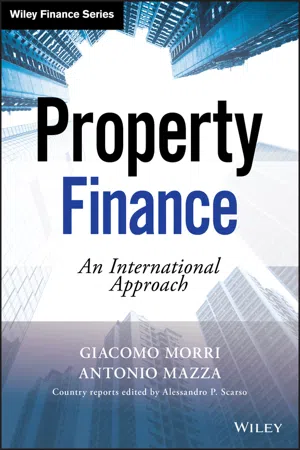
Property Finance
An International Approach
Giacomo Morri, Antonio Mazza
- English
- ePUB (mobile friendly)
- Available on iOS & Android
Property Finance
An International Approach
Giacomo Morri, Antonio Mazza
About This Book
A unique, international approach to optimal real estate financing
Property Finance is an authoritative guide to both the financial and legal issues surrounding real estate financing. Unique in its exclusive focus on the topic, this book builds from a solid theoretical foundation to provide practical tools and real-world solutions. Beginning with a discussion of the general issues encountered in real estate finance from an international perspective, the authors delve into country-specific information and set out the legal peculiarities of eight important countries (Germany, France, Italy, Spain, China, India, England and Wales) by asking questions of relevance to the leading local law firms specializing in real estate financing. The reader may thus consider in greater depth the problems relating to any given country and compare and contrast the positions under different legal systems.
Examples with numerical calculations and contract excerpts enhance the explanations presented, and are immediately followed by practical case studies that illustrate the mechanisms at work. The companion website features downloadable spreadsheets used in the examples, power point presentations, as well as real estate news and more.
Property financing entails many sources of capital, including both debt and equity resources as well as hybrid forms like preferred equity and mezzanine debt. Knowing how to work with these avenues is important to ensuring financial sustainability in real estate assets. Property Finance covers the most common issues encountered, helping readers prepare for and find a way around possible roadblocks.
- Consider the issues surrounding real estate lending at an international level
- Compare and contrast the positions under different legal systems
- Develop an international perspective on cash flows and financing agreements
- Use powerful tools to structure financing and gauge its effects on property financing
The success of a real estate investment is dependent upon optimal financing, and a mere bird's eye view of the topic does not fully prepare investors for issues ahead: Property Finance provides a knowledge-based approach to real estate investment, detailed information and powerful tools.
Frequently asked questions
Part One
Chapter 1
Introduction to Property Financing
1.1 Forms of financing: debt and equity
1.1.1 Debt
- an explicit cost defined under contract;
- the absence of any link between its cost (e.g. leading to different remuneration for the lender) and the actual return of the investment financed;
- tax deductibility in most cases.
- capital rationing (lack of equity capital);
- risk diversification;
- increase in projected earnings (in return for a greater risk);
- greater control over management.